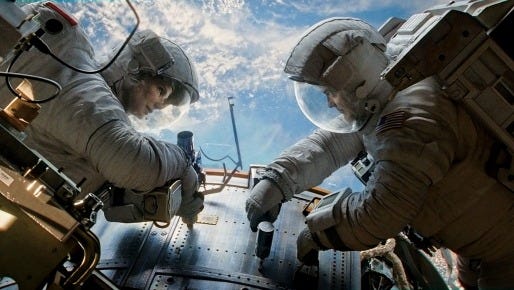Gravity

Everyone knows they're going to die, Dr. Ryan Stone muses during a rare peaceful moment in "Gravity," but it's an odd thing realizing that your death will happen today — most likely in the next few minutes. This gripping new science-fiction/dramatic thriller is the story of one woman accepting, and then rejecting, the embrace of her impending doom.
Director Alfonso Cuarón, who co-wrote the screenplay with his son Jonás, uses state-of-the-art cinematic technology to make a very old-fashioned type of movie. It's classic "you are there" filmmaking, in which the audience is inserted right into the harrowing action, experiencing it as it unfolds from the perspective of the characters as it happens.
The characters aren't very deeply drawn because they're mostly there to serve as a stand-in for the people watching. Stone, played by Sandra Bullock in a mesmerizing turn, is something of an enigma at the start — a medical engineer given a crash training course by NASA to fix a faulty computer on the Hubble telescope. By the end of her journey, we don't know too much more about her than when we started, other that her resignation has turned to resolve.
Using a mix of CGI and live-action shots, Cuarón creates a landscape in space hundreds of miles above the surface of the Earth that feels genuine, both in its eerie beauty and its utter lethality. A thoughtless mistake can quickly result in a horrible death, made even more dreadful by the knowledge that it will occur in total silence because sound doesn't transmit in space.
Watching entire space stations rendered into dust without any corresponding sound effects somehow makes it even more terrifying.
It seems as if Cuarón's camera is roaming freely through this space, so occasionally it is very far away from Stone and Matt Kowalski, the savvy veteran astronaut played by George Clooney. Other times, we're right up in their faces, or even seeing things from out the claustrophobic viewport of their helmets.
Likewise, sometimes we're assaulted by the sounds of Stone's heavy breathing as she rapidly consumes her precious oxygen or by the musical score by Steven Price. The voice of mission control (Ed Harris) soon fades away completely, though Stone and Kowalski still keep transmitting as if they can be heard.
Ostensibly, it's in case they do manage to get back into contact with those on the ground, but we get the sense their self-narration is mostly for posterity.
Things are set into motion mere minutes in, as a cascade of destroyed satellites creates a minefield of debris. Their space shuttle is shattered and the rest of the crew killed, and Stone is sent tumbling off into the darkness of night. Kowalski is a jabber and a teller of tall tales, but his bravado is comforting to the withdrawn, clinical Stone, and when they're separated, she begins to panic.
I can't go into all the different legs of Stone's arduous journey to find a way back safely to Earth because it would spoil your experience. Suffice it to say it makes "Apollo 13" look like a cakewalk. Stone must leverage her meager skills as a space voyager against her analytical mind, learn to risk all instead of playing it safe and improvise on the fly.
Watching "Gravity" is much more a visceral experience than an intellectual one. The movie grabs you by the chest and sucks the air out of your lungs, and while you're sitting in the theater, it's an utterly immersive experience. I'm just not sure if it's the sort of film that lingers in your brain for months and years afterward.
Still, I'd be lying if didn't call this one of the best films I've seen this year, because it is.
4.5 Yaps

